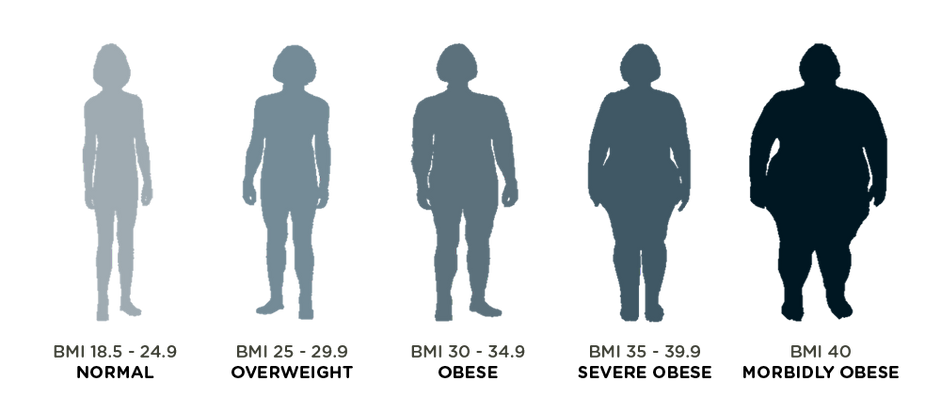BMI Calculators
Body Mass Index (BMI) is a simple calculation to assess or ascertain overall health. It is a widely-used health measure in many settings, and it's handy to know how to calculate your own BMI. Thankfully, easy-to-use BMI calculators can give you accurate measurements quickly and easily.
Body Mass Index Calculator
What is a BMI calculator?
A BMI calculator allows for quick and easy calculation of body mass index by entering height, age, gender, and weight into the calculator. This information provides an accurate estimate of body mass index which can be used to assess overall health or health risk if the result is in the higher categories.
There are many different types of BMI calculators available:
Calculations of BMI for men and women are the same; however, the closer in height you are to 6 feet, the less you would rely on BMI as a guide.
The Importance of Knowing Your Body Mass Index
Knowing your body mass index for men and women is important because it indicates your overall health status, which can help you make informed decisions about your lifestyle choices, such as diet or exercise habits.
It also allows you to monitor changes in your body over time so that you can take action if necessary to maintain optimal health. Calculating BMI by age is also an excellent way to track health and mitigate health risks as we grow older.
Additionally, knowing your body mass index can help identify potential risk factors for chronic diseases such as diabetes or heart disease so that preventative measures can be taken early on before any serious damage has been done.
What is a healthy BMI result?

- Here, you will find the ranges of BMI and see how a higher BMI indicates an increased risk of certain diseases, such as
- ● High blood pressure
- ● Heart disease
- ● Diabetes
- ● Obesity
- This applies to men, women, children, and the elderly.
BMI Classification for Adults
- Less than 18.5 underweight
- 18.5 to 24.9 healthy weight
- 25 to 29.9 overweight but not obese
- 30 to 34.9 obese class I
- 35 to 39.9 obese class II
- 40 or more obese class III

However, there are some exceptions to the standard.
The healthy weight BMI range is generally:
Lower for people of Asian background - people of Asian background reach the obese classification at a lower BMI than other ethnicities.
Higher for people of Polynesian background, older people, elite athletes with more lean body tissue and pregnant women.
As the BMI calculation doesn't consider fat or muscle, you should measure your waist to get the complete picture. Taller people can rely less on the accuracy of BMI, so combined methods should be implemented.
A BMI calculator is a standardised way of gaining insight into health. It is also used in medical scenarios as a determinant or qualification for specific treatments to assist in weight management and health, such as Bariatric Surgery, diabetes mitigation and other chronic disease management.
Should we rely on BMI alone?
BMI has been used as a guide in medical settings and insurance and is a generalised method of quantifying health/health risks. It does not take into consideration: height, muscle mass, ethnicity, and age, and it is not a complete reflection of one's body composition.
It's a good idea to combine BMI with other gauges for health or health risks, such as waist measurement, DEXA scan, or BIA scale analysis, as a more holistic representation of body composition.
Talking to your healthcare provider when considering your ideal BMI for your best health outcomes is a good idea.
BMI and the Treatment of Obesity
BMI has been used as one of the "qualifiers" for accessing the range of treatments to support those with a larger body or struggling with obesity.
Medical Weight Loss Interventions
The first step in gaining access to medical weight loss support for weight management includes programs encompassing weight loss medications alongside behaviour modification, exercise and lifestyle interventions.
-

These are conducted under the supervision of your doctor
and are geared to provide the following:
◦ Individualised care
◦ Accountability
◦ Regular conversation about your progress
-

Factors that qualify for medical weight loss:
◦ BMI of 30 or greater
◦ BMI 27 or more, with one condition related to carrying extra weight
(for example, diabetes, high blood pressure)
The goal is that medical intervention can start before other health problems eventuate. It's not always a matter of eating less and exercising more - especially when that has been tried alongside diet modification.
Medical intervention is an answer to helping patients to lose weight safely and more permanently when other avenues have been exhausted. And patients need to know that they are not to blame when they have tried to lose weight without success. Supervision is a significant key to the success of the medical weight loss model.
BMI and surgical weight loss - Weight Loss Surgery / Bariatric Surgery / Bariatric / Metabolic / Weight Loss Surgery is the most effective tool for rapid and permanent weight loss and long-term health gains.
Gastric Sleeve and Gastric Bypass Surgery are the most commonly performed procedures. Initially, the goal of the surgery was to reduce the stomach's capacity, initiate weight loss and restrict intake long-term to keep it off. However, it was discovered soon after that other far-reaching effects on hormones and chemical messages sent to the brain related to hunger and satiety are also implicated - which is where the benefits lie.
Whilst the surgery sounds radical, it's generally used only in specific circumstances and when other health risks reduce the quality of life and longevity.
After 30 years with the only minor scientific review, the new international guidelines for Bariatric Surgery were released by the ASMBS and IFSO - and what a welcome relief!
In the 1991 surgical guidelines, bariatric and metabolic surgery was confined to patients with a BMI of 40 or greater or a BMI of 35 with at least one obesity-related condition. It was considered for patients with a BMI of 30-49 with metabolic disease and was "appropriately selected for children and adolescents".
Opening Opportunities for Timely Treatment
The updated guidelines, now used internationally, recommend Bariatric Surgery for those with
- A BMI of 35 or more, regardless of comorbid/obesity-related disease
- A BMI of 30-34.9 if there is a concurrent metabolic disease

Looking to Start Your Transformation Journey?
Shop our
Meal Replacement Range
The ASMBS and IFSO Guidelines provide an important reset regarding the treatment of obesity. Insurers, policymakers, healthcare providers, and patients should pay close attention and work to remove the barriers and outdated thinking that prevent access to one of the safest, most effective and most studied medical operations.
Using a BMI calculator is easy for anyone—regardless of age or fitness level—to estimate their current health level. Knowing one's body mass index helps males, females, children, adults, and teens make informed decisions about their lifestyle choices to maintain optimal health and identify potential risks for chronic diseases.
If you want to keep track of your overall health status, feel free to take advantage of our FREE BMI calculator today!









